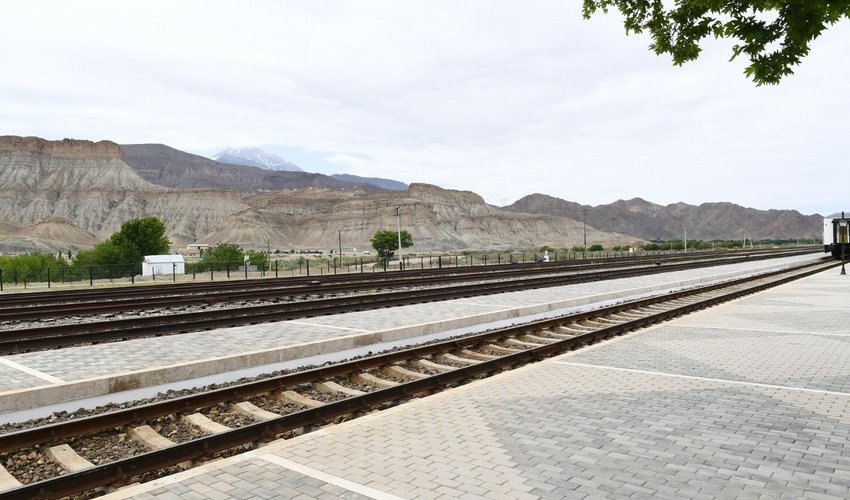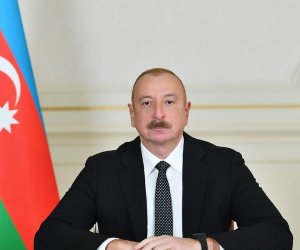Media: Iran opposing opening of Zangazur corridor

Iran is slowing down regional development by opposing the opening of the Zangazur corridor, reported from Foreign Affairs.
The creation of the Zangazur corridor, which will connect two parts of Azerbaijan by land - the Nakhchivan Autonomous Republic and the rest of the country - would cut off Iran’s access to Armenia, because the two countries would no longer share a border.
"Iran views Armenia as a critical link with Eurasia and has threatened to use military force against any changes to the internationally recognized borders of the region. During a meeting with Turkish President Recep Tayyip Erdogan last July, Iran’s supreme leader, Ayatollah Ali Khamenei, warned against creating a barrier between Iran and Armenia by blocking what "has been a communication route for thousands of years,” reads the article.
Foreign Affairs notes that the Karabakh war has created new realities in the region, where "Iran, which is ruled by Shiite clerics, has provided an economic lifeline to Christian-majority Armenia, whose primary backer has long been Russia. Meanwhile, Israel and majority-Sunni Türkiye have formed a strategic alliance with predominantly Shiite Azerbaijan.”
According to the article, relations between Azerbaijan and Iran are going through very difficult times. In particular, Iran is very concerned about the improvement of Azerbaijan’s relations with Israel.
"In recent years, Iran has watched as Israel and the Persian Gulf Arab monarchies have grown closer, owing to a shared enmity toward Tehran. The Iranians now fear that a similar dynamic is taking shape between Israel and two countries with predominantly Turkic populations, Türkiye and Azerbaijan,” reads the article.
In turn, relations between Iran and Azerbaijan are becoming increasingly strained. Over the past two years, the Iranian regular army and the Islamic Revolutionary Guard Corps (IRGC) have conducted large-scale military drills along the border with Azerbaijan and practiced crossing the Aras River, which separates the two states.
Tensions further increased in January when a gunman stormed Azerbaijan’s embassy in Tehran, killing its security chief and wounding two others. Baku called it "a terrorist attack” and evacuated the embassy; Iranian officials insisted that the attacker had personal motivations rather than political ones.
Then, on March 28, an anti-Iran Azerbaijani lawmaker survived an assassination attempt. The next day, Azerbaijan opened its embassy in Tel Aviv, becoming the first majority-Shiite country to post an ambassador in Israel.
After that, Azerbaijan discovered a whole group of people working for Iran, and also declared 4 employees of the Iranian embassy in Baku persona non grata.
www.anews.az
The creation of the Zangazur corridor, which will connect two parts of Azerbaijan by land - the Nakhchivan Autonomous Republic and the rest of the country - would cut off Iran’s access to Armenia, because the two countries would no longer share a border.
"Iran views Armenia as a critical link with Eurasia and has threatened to use military force against any changes to the internationally recognized borders of the region. During a meeting with Turkish President Recep Tayyip Erdogan last July, Iran’s supreme leader, Ayatollah Ali Khamenei, warned against creating a barrier between Iran and Armenia by blocking what "has been a communication route for thousands of years,” reads the article.
Foreign Affairs notes that the Karabakh war has created new realities in the region, where "Iran, which is ruled by Shiite clerics, has provided an economic lifeline to Christian-majority Armenia, whose primary backer has long been Russia. Meanwhile, Israel and majority-Sunni Türkiye have formed a strategic alliance with predominantly Shiite Azerbaijan.”
According to the article, relations between Azerbaijan and Iran are going through very difficult times. In particular, Iran is very concerned about the improvement of Azerbaijan’s relations with Israel.
"In recent years, Iran has watched as Israel and the Persian Gulf Arab monarchies have grown closer, owing to a shared enmity toward Tehran. The Iranians now fear that a similar dynamic is taking shape between Israel and two countries with predominantly Turkic populations, Türkiye and Azerbaijan,” reads the article.
In turn, relations between Iran and Azerbaijan are becoming increasingly strained. Over the past two years, the Iranian regular army and the Islamic Revolutionary Guard Corps (IRGC) have conducted large-scale military drills along the border with Azerbaijan and practiced crossing the Aras River, which separates the two states.
Tensions further increased in January when a gunman stormed Azerbaijan’s embassy in Tehran, killing its security chief and wounding two others. Baku called it "a terrorist attack” and evacuated the embassy; Iranian officials insisted that the attacker had personal motivations rather than political ones.
Then, on March 28, an anti-Iran Azerbaijani lawmaker survived an assassination attempt. The next day, Azerbaijan opened its embassy in Tel Aviv, becoming the first majority-Shiite country to post an ambassador in Israel.
After that, Azerbaijan discovered a whole group of people working for Iran, and also declared 4 employees of the Iranian embassy in Baku persona non grata.
www.anews.az
Similar news
Similar news
Latest news 
More news 



































 Photo
Photo 



 Video
Video 

